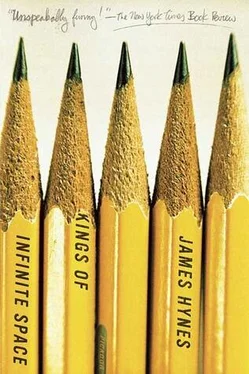“Who’s here?” Paul whispered, afraid to move any deeper into his own room. “Mrs. Prettyman, are you in here?”
But the apartment was too small for anyone to hide in. He peered through his bathroom door and saw that the tub gleamed a little brighter, and his towel hung a little straighter.
“Charlotte?” he said, his voice beginning to tremble. “Did you do this?”
But Charlotte was nowhere to be seen, having vanished into the ether, or wherever ghost cats went. He turned slowly away from the kitchenette, as if afraid to turn his back on his newly gleaming stove and countertop, and saw that his bed was still pulled out but that someone had tucked the sheets and blanket in all around, military style, tight enough to bounce a quarter. The pillow had been smoothed flat and centered at the head of the bed.
And then, as Paul’s pulse pounded in his ears, he saw, neatly centered on the bed, resting lightly on the taut drumhead of his blanket, the little blue Tiffany’s box that he had discarded that afternoon at work, the Outstanding Stand-in award that he had jammed in among the crushed and sticky cans in the recycling box. It sat on the middle of his bed, almost glowing, as if at the center of a little spotlight.
“Oh boy,” Paul said, to no one in particular.
AFTER A FITFUL NIGHT, miraculously uninterrupted by Charlotte, Paul gave up trying to sleep and got out of bed at 6:30. As a result of last night’s energetic lovemaking, he ached in muscles he hadn’t known he had, so he showered longer than usual, letting the hot water soak into his thighs and his shoulders. As he shaved he was pleased to find a bright purple hickey just above his left nipple, and he took a moment in the glare of the overhead light to twist this way and that in the mirror, looking for another. But his anxiety crept up on him again as he dressed, so, as he prepared his breakfast, he made some executive decisions about the carnival ride of the previous day. His graduate training in literary theory had taught him that there was no one, indisputable interpretation of any situation. There is no truth; all reality — Paul reminded himself as he poked at his scrambled eggs with his plastic spatula — is linguistic. So there was no reason to accept the hegemonic construction of yesterday’s events.
In other words, Paul decided, I do not work for Olivia Haddock, and this morning I’m going to make that fact clear to that spineless little milquetoast Rick. That’s number one. Next, Paul decided, the recycling box is a recycling box, not the portal to some bottomless, infernal pit. I was upset, he thought, my mind was playing tricks on me. Just as it was — decision number three — when I thought I saw the Colonel give a thumbs-up to Boy G and the others on the bridge. For obvious reasons — thank you, Charlotte — I am prone to seeing the bizarre around every corner.
Paul sloshed the eggs, still runny, onto his purple plate, and retrieved the salsa from the dank recesses of his fridge. Number four: no more lunches with the Colonel and his stooges. I don’t know what they want from me, and I certainly don’t want anything from them. He doused the eggs liberally with salsa, then hesitated with a forkful halfway to his lips. What number am I up to? he wondered, then decided, I tidied up my own apartment last night, before Callie showed up. I just don’t remember doing it. And finally, I stuck the Tiffany’s box in my pocket without thinking about it, brought it home myself, and left it on the bed. ‘Nuff said. The end.
After breakfast, Paul put the Tiffany’s box into his lunch bag with his cheese sandwich and his little baggie of pickles. As he carried it out to his car in the early morning heat, he was intercepted by Mrs. Prettyman, who came teetering down the parking lot in her high heels as if walking on tiptoe. “Oh, Mr. Trilby!” she sang.
Paul didn’t care if she saw him roll his eyes. “Good morning, Mrs. Prettyman.” He opened his creaking door and slung his lunch onto the passenger seat.
“The owner would like to know,” said Mrs. Prettyman as she clicked around the rear of Paul’s car, “if you have a roommate.”
Paul slouched in the open door of his car with his hand on the roof, a very Snopesish pose.
“Because the terms of the lease explicitly state,” she went on, with her hand at her throat, “that each extra occupant costs an extra one hundred dollars a month.”
Paul had never signed a lease; he had never ever seen one. “I don’t have a roommate,” he said. Mrs. Prettyman must have seen Callie last night, but he didn’t know what to call her in front of his prying landlady. Yes, she was his squeeze, his inamorata, but she certainly wasn’t his roommate. “A friend of mine came by last night,” he said, “but she doesn’t live with me.”
“I don’t mean the young lady in the pickup truck,” Mrs. Prettyman said with an insinuating intonation. Did this woman do nothing but peer through her curtains? “I meant the pale gentleman.”
“The pale gentleman?” Even in the morning heat, Paul felt a chill.
“Well, I don’t know his name.” Mrs. Prettyman rubbed her clavicle with her long, nicotine-stained middle finger. “I just noticed him fiddling with the grate.”
“The grate? What grate?”
“The storm sewer?” chirped Mrs. Prettyman helpfully. “In the middle of the parking lot?” She half turned, and Paul lifted himself on his toes to peer at the square, rusty grate behind her.
“What do you mean, fiddling with it?”
“Well, truly, I don’t know,” his landlady said, leveling her gaze at him. “But he was fiddling with it, then he stood up and went into your apartment. So I figured surely he must be a friend of yours.”
“How did he get in?” Paul felt chilled all over. What did she mean by “pale gentleman”?
“Honey, you must have given him a key because I surely did not.”
Paul glanced back at his door. He was positive he had locked it when he left with Callie.
“Then I happened to look up from my program about, oh, twenty minutes later?” sang Mrs. Prettyman. “And out he come and commenced to fiddling with the grate again.”
Paul swallowed. “Where did he go?” He wasn’t sure he wanted to hear the answer.
“Well.” Mrs. Prettyman canted her hip. “I got up to come out and have a word with him — I figured the owner would like to know? — but by time I got to the door, he was gone.”
Paul glanced along the balcony across the parking lot. “Did anybody else see him?” He wondered if he could pluck up the nerve to question his hard-bitten neighbors.
Mrs. Prettyman narrowed her gaze. “So I can tell the owner that you do not know this man?”
“No, I don’t know him.”
Mrs. Prettyman edged closer to Paul, and for the first and last time, she seemed to take pity on him. “Are you missing anything? Did he take anything?”
Paul warded her off with a gesture. This was not what he wanted to hear; this was not the construction he wanted to impose on the events of the previous evening. He had intervened against the hegemonic discourse — there had been no pale gentleman in my apartment bearing Tiffany’s boxes, tidying up. Because if there had been, then Paul’s own construction of the day before, his brave little house of cards, would come tumbling down, and he would have to reckon with the Colonel signaling the men on the bridge, with the groaning void below the recycling box, with the froggish croak of Dennis the Dying Tech Writer whispering, “They’re up there. . ”
“Nothing was taken,” Paul insisted.
Mrs. Prettyman dropped her voice to a whisper. “Because I do not want to have the police out here. Not if I don’t have to.” The moment of pity was over; this sounded like a warning.
Читать дальше












